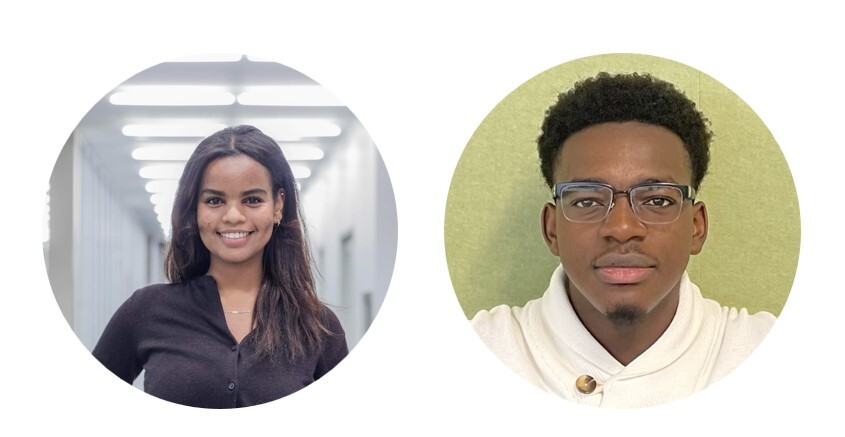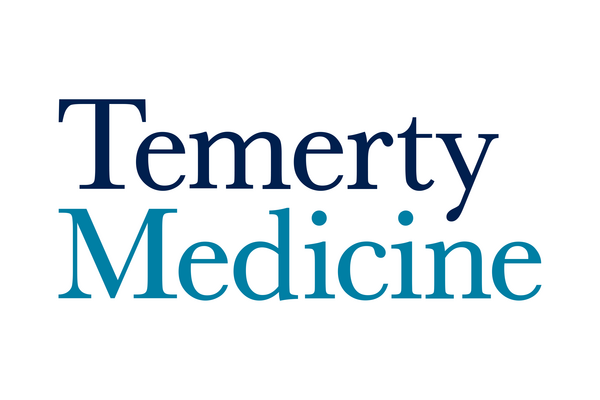Meet Bethel Samson and Cheikh Tchouambou Youmbi
U of T's 2023- 2024 Black Medical Student Association Co-Presidents

 During the late summer, prospective applicants had a chance to meet our 2023- 2024 Black Medical Student Association Co-Presidents, Bethel Samson and Cheikh Tchouambou Youmbi. They both joined us for a Let's Chat session to talk about going through the medical school application process and their experiences as medical students. Here's more from that conversation:
During the late summer, prospective applicants had a chance to meet our 2023- 2024 Black Medical Student Association Co-Presidents, Bethel Samson and Cheikh Tchouambou Youmbi. They both joined us for a Let's Chat session to talk about going through the medical school application process and their experiences as medical students. Here's more from that conversation:
Tell us a bit about yourself. Where did you attend for your undergraduate studies and what was your major?
Bethel: Hi, my name is Bethel and I graduated in 2022 with a Bachelor of Health Sciences at McMaster University and specialised in Child Health.
Cheikh: Hey, my name is Cheikh. I attended McMaster University. I started off in the Life sciences program and then proceeded to transfer into Health Sciences, where I completed my Bachelor of Health Sciences at McMaster University in spring of 2022.
What was the application process like for you?
Bethel: Arduous and uncertain are two words that come to mind first. It’s obviously a long process, and there were many times where I was filled with self-doubt. I was lucky enough to have a support system that consisted of my family, friends, and some professors that really encouraged me to keep making my way down the path, and reminded me of my abilities when the imposter syndrome occasionally crept in.
Cheikh: Overwhelming would be an understatement. There is a fear of the unknown, a fear that there is a hidden blueprint that you do not have access to. I second-guessed everything about my application. I was chasing a “perfect application" which, spoiler, does not exist. I allowed the overthinking and stress to take over my life, impacting my daily interactions. I felt like not being admitted would be a public indictment, a failure. I regret having that perspective.
I hoped that once the application was submitted and the interview was completed, the stress would subside. However, to my surprise, it worsened for me. I learned that I like feeling in control of my destiny. The waiting game was gruelling for me. In hindsight, that experience forced me to develop healthy coping mechanisms that are useful today.
What would you say were the reason(s) you chose University of Toronto for medical school?
Bethel: My dad did a degree at U of T and always spoke of his time here so fondly, so growing up, I could easily envision myself here. But aside from that, the University of Toronto continues to be a leader in medical research, innovation, and practices of care, and I wanted to be at the epicentre of it all. Also, especially in undergrad, I followed the U of T BMSA social media pages and was very inspired by their leadership in advocacy, and initiative and efforts, all while balancing their responsibilities as medical students. I wanted to follow in their steps and be in an environment where medical students felt empowered and heard.
Cheikh: To me, community is most important. I wanted to attend a school that understood that and took steps to ensure it. U of T has a significant amount of Black medical learners who excel and could mentor me through unfamiliar environments. Secondly, I wanted to be in the city. We have the best hospitals, which allow learners to work with world-class staff and educators. That is an opportunity I did not take lightly.
What are some of the opportunities that are available for students at Temerty Medicine?
Bethel: One opportunity I’m really glad I took advantage of was an interest group. As part of the Obstetrics and Gynecology Interest Group, I’ve had access to events to learn about the field and spoken to physicians who practise it. I also have had the opportunity to be a part of the Sunnybrook Program to Access Research Knowledge (SPARK), a research program for Black and Indigenous U of T medical students, spearheaded by Dr. Mireille Norris.
Cheikh: The opportunities are endless. U of T offers students access to world-class medical centres. We, as learners, can shadow extensively and expose ourselves to all fields of medicine. Numerous opportunities exist for research, quality improvement and/or advocacy projects. Students can advocate for health equity and medical curriculum reform through clubs or independently.
How would you describe the academic pressure and/or workload?
Bethel: They don’t lie! The workload is heavy, but consistent. You can definitely develop a weekly routine which helps me not fall behind. I definitely preferred the almost biweekly testing, as opposed to a large final, because I was forced to maintain my habits, and the tests feel less high stakes than a single exam.
Cheikh: Everything is an adjustment. In my first year, I struggled in the first few months. In my opinion, medical school requires a different studying approach. Studying techniques that were previously successful in my undergraduate journey were not the most effective in medical school. It is like learning a new skill. Once I found a combination that worked, the remaining challenges were time management, discipline and redlining the meaning of work-life balance. Work-life balance is not 50/50 split all the time. Rather, it could be an 70/30 split in favour of work for two weeks, followed by the opposite split for three weeks. Obligations and workload come in waves.
What student support services or resources would you recommend that incoming students utilize to ensure successful transition to medical school (e.g., academic advisors, counsellors, etc.)?
Bethel: I would encourage incoming students to utilize the Office of Learner Affairs (OLA) once accepted to medical school. The OLA offers a variety of services ranging from academic and clinical Skills enhancement, personal counselling, career counselling, and accommodation and accessibility services. All discussions with the OLA are kept confidential, so they can provide true support when you need it the most.
Cheikh: The OLA was useful for me. They offer a diversity of programming that I utilized in my first year. The Community of Support (COS) is also very helpful. Whatever support you may need, if you are an equity-seeking student, I have found the COS to be helpful in connecting learners to the right people and resources to enable their success.
What is your favourite class?
Bethel: Clinical skills, hands down! Integrated Clinical Experience (ICE) is also the class that combines class content and real people and challenges you to find connections between everything you have learned in order to make a differential diagnosis by talking to and examining a patient. You start feeling like - wow, someday I will actually be a physician - in ICE. Credit here is due in part to two incredible tutors that I had, who helped me evolve into someone more confident conducting patient histories and physicals.
Cheikh: I thoroughly enjoyed the Anatomy labs. Clinical Skills and Case-Based Learning come close, however.
How would you describe your work/life balance? What do you enjoy doing in your spare time?
Bethel: You can be in medical school and have a life - but it is challenging. The weeks where you have a test, it can be a lot harder to see your friends and make time for things you like. But, from what I’ve heard, residency is a whole different beast, so I am trying to enjoy my spare moments while I have them! I really like to play basketball and soccer intramurals with the U of T medical student team, explore the city with my friends, and discover new cafes.
Cheikh: A priority when starting medical school is to make a list of your hobbies. I tiered my list. At the top, I had my non-negotiable activity. These are the hobbies you will always make time for. For me, it was varsity soccer. After the season, the gym replaced that time slot. Other hobbies I enjoy are watching the Joe Budden Podcast, listening to music, and outings with my friends, such as a board game night at Snakes and Lattes.
Do you have any advice to give to prospective applicants?
Bethel: The importance of listening and internalising feedback, both in the application process and throughout medical school, cannot be overemphasised. When writing your brief personal essays and preparing for interviews, have others edit your work and your words, and give you feedback. Listen to it, and adjust accordingly, of course while maintaining your own voice, but make sure to be unhindered by ego, and filled with humility, in order to yield best results. I have tried to apply this same lesson in medical school, and I think it has helped me become a more flexible learner.
Cheikh: I prefer to “fail” as myself than to “fail” trying to portray myself as somebody else. The way I see it, application assessors are experienced and able to detect applications that are not authentic. Take the time to reflect on who you are and how best to illustrate that in your application. You’ve done the work required; you are special in your own right; believe in yourself and your exploits.


